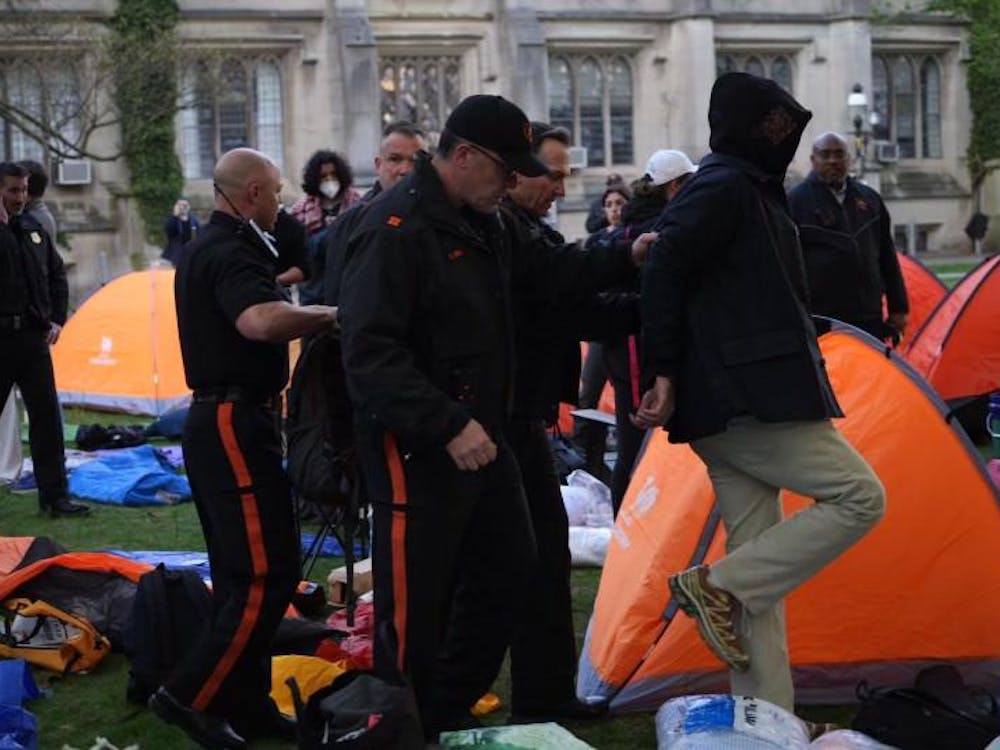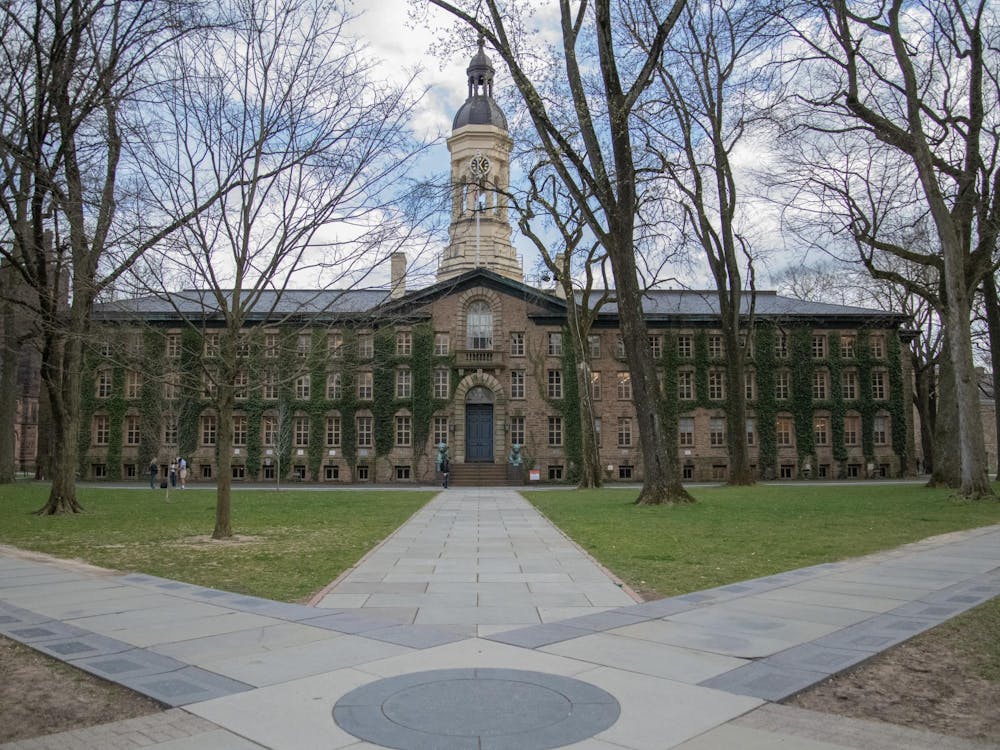Former University and United States presidentWoodrow Wilson, Class of 1879,is often noted for his domestic and international achievements, but was a divisive figure,Cecilia Rouse, dean of the Wilson School,said in a panelon Friday.
“He alienated many while denying the others the fullness of their humanity on racial grounds,” she said.
Under his watch, the University remained a bastion of white Anglo-Saxon Protestantism, and on a national level, segregated the Federal Civil Service, which closed a pathway for the advancement for African-Americans, she added.
Panelist Chad Williams GS ’04, associate professor and chair of the Department of African and Afro-American Studies at Brandeis University, said thereis a bigger conversation to be had about how we think about history and the place of black people in this country’s history.
He said that as a student, he understood the dissonance that had animated the BJL protest: the feeling of being “at” Princeton, but not “of” Princeton.
“Having this conversation is very important. It’s essential and speaks much more to Woodrow Wilson,” he said.
The understanding of Woodrow Wilson, one that is held by many historians, presents an ideal of democracy and of potential that is truly beautiful, he said. At the same time, this understanding is truly terrible, he noted.
“American history is longer, larger, more various, more beautiful and more terrible than anything anyone has ever said about it,” Williams said, quoting James Baldwin.
The behaviors of Wilson as president and commander-in-chief, in terms of African-American rights, was egregious, he said.
“When we think of the role of the presidency, and of Woodrow Wilson specifically, it’s not about judging him by 2016 standards, but as a president,” he said.
His management styles as president were also deeply problematic, he said.
“How do we reckon with the history of the time period, the Wilson era, which is one of the most devastating in this country’s history when it comes to African American rights—the nadir?” He asked.

This history of systematic exclusion and segregation is still present, he said. While these discussions provide greater insight, it is also important to ask whether or not this is enough, Williams added.
Eric Yellin GS ’07, an associate professor of history and American studies at the University of Richmond, said that Woodrow Wilson’s segregation of the federal government was mentioned in one line in his textbook.
“What did it mean in the lives of the people who were segregated? What did it mean to have a color line drawn across your career, your city, your workplace?” he asked.
He said that we often think about this as a problem of spatial arrangement, that Wilson was an ordinary racist.
“We build buildings to Presidents and famous leaders,” Yellin said.
What Wilson did was attack African-Americans by ending careers and making workplaces inhospitable, Yellin added. African-Americans were not allowed to achieve, to obtain positions in high offices as a result, he said.
“Wilson claimed to be a progressive—he ran in 1912 and said he had the best of hopes for everyone, including African-Americans—so he had to justify this administration’s actions, and that’s where I think we get a bigger problem,” he said.
The problem is that this was considered progressive and in the best interests of all Americans, to separate out African-Americans because they are a problem, he said. Yellin added that this bureaucratic justification has been seen in history time and time again.
“The question of whether this could ever happen, and happen with a successful outcome, Wilson puts on the table, and it requires an erasure of 30 years of African-Americans serving the nation at all levels of the federal government,” he said.
In 1912, there were 400 middle class, white-collar African-American men and women working in the federal government with white people working under them.
“To get up and claim that there was friction, when there was no extent record of white people in any broad record objecting to this position, involves writing black people out of the progressive vision,” he said.
Ashleigh Lawrence-Sanders, a Ph.D. candidate in the Department of History at Rutgers University, said Africans-Americans in that era had to contend with a nation that had erased their legacy of emancipation, which Wilson perpetuated.
“When we talk about reckoning, what does this really look like? This is the long tradition of protest that have continued across American campuses,” she said.
She added that this protest tradition is important in how we think about Wilson. During Wilson’s presidency, many African-Americans supported Wilson and were severely disappointed by his administration.
“Why do we care about this particular name? One is because we link this to the very real realities for American Americans on the ground,”Lawrence-Sanders said.
She said that the protests that occurred across college campuses aren’t just about the name itself, but about what’s happening to the individual students and what they see as wrong.Lawrence-Sanders added that historically, African-Americans have never really been given a voice in decisions.
“We don’t see the equal attention paid to the African-American or Native-American history that we do see now,” she said.
In the naming of the Woodrow Wilson School building in 1935, African- American students and faculty were never involved in the deliberations.
“What are we going to do with this commemorative landscape?” Lawrence-Sanders asked.
A. Scott Berg ’71, a Pulitzer Prize-winning biographer of Wilson and a member of the TrusteeCommittee onWoodrow Wilson’sLegacy, said he would speak on behalf of the era that Woodrow Wilson had lived in.
“I spent countless hours on this campus and at home, and reading 650 statements on Woodrow Wilson, hearing lots of people testify about Woodrow Wilson before us, and I was often alarmed to hear this misinformation,” he said.
He added that even in the New York Times, the way that Woodrow Wilson has been discussed is often misleading and over-extrapolates.
“I’ve heard that Woodrow Wilson was a great misogynist,” he said.
Unlike Wilson’s portrayal in the New York Times as a supporter of the Ku Klux Klan, Berg said he believes that this is an incorrect characterization.
“I don’t think he was a hater, that he is a bigot; yes, he was a racist,” he said.
Wilson’s first contact with an African-American student was through a letter, Berg said.
“This campus existed for 160 years before it had to deal with an African American,” he said.
Wilson had advised the student not to come to the campus because he understood that it would be difficult for to student to integrate himself into the heavily Southern, racist environment, Berg noted.
“As a result of that, this has been blown up into ‘Wilson has barred blacks from attending Princeton,’” he added.
There are two points left out in the argument about what Wilson did, he said. He hid behind his Postmaster and his Attorney General, who were Southern bigots, Berg said.When Woodrow Wilson was president-elect, a steady flow of Southerns had approached him, telling him that his progressive agenda was never going to pass if the integration of his government continued, he added.
“Woodrow Wilson was genuinely a centrist in his day,” he said.
Berg said many members of the Congress and House of Representatives at the time were proud members of the Ku Klux Klan, and the law of the land was Plessy v. Ferguson. Congressmenhad asked Wilson to fire all of the black members of the civil service, but Wilson did not, he added.
“During his presidency, Wilson kept the race conversation going,” he said.
Berg said that the appointment of Louis Brandeis to the U.S. Supreme Court was extremely controversial. In another instance, as University president, Wilson wanted to appoint an individual who was Unitarian, but the Board of Trustees adamantly disagreed, he said.
Berg said he believed that Wilson tried to ignore the “race problem,” as it wasn’t on his agenda.
“If you look at the Democratic platform on which he ran on in 1912, you will see not a word about Civil Rights,” he said.
This was a recurring theme throughout history, as even the supposedly progressive and socialist Eugene Debs told demeaning “darky” jokes of the time.
At the same time, Berg said that Wilson should have opened up racial divides afterWorld War I, in which many African-Americans had given their lives for a nation that had neglected them. He added that Wilson’s omission of recognition was devastating.
“He did nothing,” he said.
Yellin argued that Washington, DC wasn’t segregated because it was controlled by Congress, and there were enough Northerners who had rejected the idea that the nations capitol should be segregated.However, there seemed to be an ulterior motive, as the Northerners realized that firing all black civil service workers would mean that there is no one to take the menial jobs, he said.
“Segregation is how do you make people feel less, and available for work,” he said.
Williams added that it took African-Americans to drive the race conversation and forcing Wilson to have meetings in the White House. This fact iscritical to how we assess Wilson’s legacy, he added.
“In what way do we include and exclude African-Americans in this discussion?” He asked.
Williams questioned why Wilson would appoint a Jewish individual but neglect to include African-Americans.
“We see how the race question, as it was termed at the time, was something that African Americans were deeply engaged in, but moving beyond seeing themselves as a problem,” he said.
Although Wilson was not a member of the Ku Klux Klan, he is still considered a white supremacist, Williams said.Wilson had a vision of a nation where African-Americans were not seen as full citizens, and to a degree, as people. During that time, African-Americans were subject to violence inflicted on them, including babies thrown into burning buildings and lynchings, but Wilson made no response, he said.
“How would Wilson have responded if it had been another group of people?” he asked.
Williams noted that Woodrow Wilson’s failures to address concerns, and neglect of racial terror and race riots across the country, were galvanizing for African Americans.
“Maybe we should be thanking Woodrow Wilson for creating the modern Civil Rights Movement,” he said.
Lawrence-Sandersnoted that Wilson often looked at African-Americans in a paternalistic way by assuming that they were not capable of keeping up with the academic rigors at Princeton.
“This all goes back to this idea of not seeing African-Americans as full citizens, and actually not as his constituents,” she said, adding that Wilson assumed that African-Americans were not prepared to be full voters and political leaders in the country, and certainly not full citizens.
“Wilson wasn’t a Vardaman, he wasn’t this virulent caricature of a racist, so we want to try and excuse him from the real damage that his policies and legacy did,” she said.
The panel, entitled “Woodrow Wilson’s Legacy on Race,” took place at4:30 p.m.on Fridayin Dodds Auditorium, Robertson Hall. The event was followed by a Q&A and reception in the Bernstein Gallery. The panel was co-sponsored with the Seely G. Mudd Manuscript Library.








